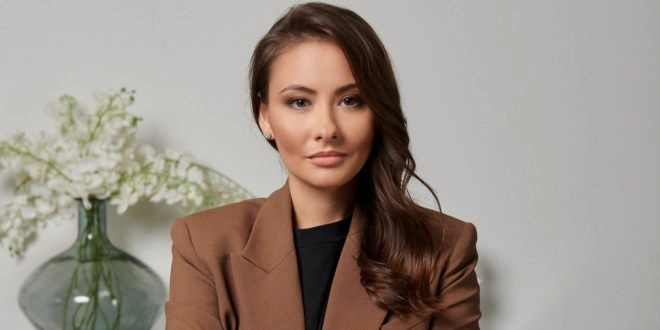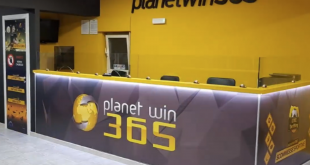Katerina Biloruska, Parimatch Tech’s Co-Founder and Chairwoman of the Parimatch Foundation, shines a spotlight on some of the company’s corporate social responsibility initiatives and the need for wider industry collaboration in the face of adversity.
Thanks for speaking with SBC Leaders Magazine! Can you begin by telling us a bit about your career – you started off as a journalist?
That’s right. I studied journalism for five years. However, I never actually worked as a journalist! I studied journalism because it seemed like a very interesting, somewhat romantic profession, and I was good at writing during my school years. But as I studied more, I realised that journalism wasn’t for me.
In Ukraine, being a journalist isn’t a very straightforward path—most of the articles you write are ordered by someone. This wasn’t something that appealed to me. Working with a good news outlet is also a very long, convoluted process—so that was when I decided that it wasn’t for me. But during my studies, I learned a lot about communication processes, which is the knowledge that can be applied across any industry and is something that I draw upon a lot in my current role.
Despite journalism not being the career I wanted to pursue, I was lucky enough to have the opportunity to work within the family business, so I embarked on a new challenge.
You have held a number of positions at Parimatch Tech, including co-founder, account manager, project manager, CBDO and Head of Corporate Development. What would you say have been the biggest challenges that you have faced during your career?
So, you have probably looked at my CV and thought, ‘how strange? Every position has been different, and she has worked in every part of the business!’.
And you’re not wrong. Parimatch is my family business. When I joined the company, I had the opportunity to have any job title that I wanted. But I doubted that was a great idea in the long run. I started as an Account Manager in a very junior role, working with different countries, collecting information and creating analysis reports.
Then, I gradually moved to another position in an entirely different part of the business. That was interesting because the company was going through a period of transformation. Those first few years of my working at the company were like we were living in a time of constant transformation, development and change. That was why it was so crucial for me to work in different sectors of the company—I was not just an employee, but this was also my family business.
If we look at the challenges I faced, I think we need to start when the company was first created. Parimatch was born in Ukraine in 1994. At that time, we were a traditional betting company with a significant retail presence. But one big problem was the ban on betting in Ukraine.
At that time, the company was already operational in other countries—mainly within the CIS region—but Ukraine was still a huge market, presenting a considerable difficulty when the ban was imposed.
When I joined, the next big challenge was transforming the company from a retail-first to an online-only operator. This was not something that many other companies were doing at the time, so as you can imagine, it was quite tricky. Then, more recently, we transformed from an online operator into a technology company.
We’re not positioning ourselves as a gambling company—we are now a technology company. That is a massive transformation in itself. When I started at this company, there were only a handful of IT people—I’d say no more than five. Now, Parimatch Tech has nine R&D centres around the world in which more than 1000 IT specialists cover the development and infrastructure support of the Parimatch platform entirely.
We have come up against plenty of challenges in recent years, but I think that our primary success is that we have created something new and innovative. I would say that Parimatch was a start-up when I first joined, and now we have grown into an ambitious player in a worldwide gambling market driven by technologies and in-depth industry expertise.
So more specifically, how has working across several divisions of the company shaped your leadership style?
I have mostly fashioned my leadership style on three main pillars. I think most of the knowledge I learned about this industry, and Parimatch in particular, is from my experience working within different roles. Likewise, I do not have any specific education in this field—admittedly, before I came into this company, I wasn’t very knowledgeable about how this industry worked. That has all been learnt on the job.
During that time, I learnt a lot, both about the company but also about management and establishing relationships. I am continuing to learn, grow and adapt to the company. This has been particularly apparent when we face difficult situations—such as when the war started in Ukraine. This created a lot of problems for us, but also some new opportunities for things we have not done before. It also brings a lot of new knowledge, and I think it is essential to learn from each situation you face in your career.
Another pillar is also developing self-confidence. It is not necessarily easy for a woman in this industry—especially in the gambling and technology spaces. Over the last few years, female representation has improved; there are many more women now, and it’s becoming easier for them to progress. But still, when you’re in a meeting room, and you’re one of the few women, there are times when you begin to question whether you deserve to be there. But you need to remember that you earned your place in that meeting, you know what you’re talking about, and you have the authority to discuss that subject matter. You have to have that confidence in yourself to succeed in business. That is very important. Without that, the female representation will not change within the technology and gambling industry. That is incredibly important to understand and champion as a leader.
Among other things, you serve as the Chairwoman of the Parimatch Foundation. For those that don’t know, what are the Foundation’s core aims?
So, I would say that the Foundation’s life can be divided into two parts—before the war and after.
When the Foundation was created, the main mission was to provide a happy future for children, and sport was a very powerful tool to do that. So by involving children in the sports programme we organised, we wanted to teach them skills like leadership, teamwork, communication etc.—all of which can be incredibly important for them in the future.
We work with children with disabilities and are allowed to participate in sports. The Foundation mostly works in Ukraine, but we have programmes in Cyprus too. In both countries, we found that there was minimal infrastructure in place to enable children with disabilities to take part in sporting activities. We wanted to train coaches who can then work with these children and create sessions that everyone can take part in. Sports have been shown to have very positive effects on physical and mental health—being a part of a team can help provide that emotional boost because it makes the children feel like they are a part of something.
We also work with children from low-income families to give them the opportunity to access sports programmes. The Foundation is working with schools and PE teachers to create a number of educational programmes for these children.
But since the war started, we have had to change our thought process because we now understand that education and sports programmes aren’t necessarily the first things children in Ukraine need. That’s why we have begun working with local authorities, regional military administrations in Ukraine and the volunteer groups to help families evacuate and help accommodate them somewhere that is much safer.
We have been working with hubs in Western Ukraine, providing temporary shelter for families with children. The Foundation has been trying to help make sure they have everything they need—from food, clothes, medicine and aid. Since the war started, we have been focusing much more on basic things for children.
A few months back, we realised that it was important to restart our sports programmes because there is a war, but children still need to develop. People want to feel like they are returning to normal. We are still providing humanitarian support to those that still need it in Ukraine.
As well as our sports initiatives, we have launched a programme to support mental health. We have been working with psychological specialists, as well as the Israel Trauma Coalition, on how to work with children that have been suffering from trauma due to the war. This has been a hugely traumatic experience for both adults and children.
The specialists we are working with have been working alongside teachers to educate them on how we discuss the war with children and how we begin to unpack what they have been going through. These are incredibly difficult topics to discuss, so we wanted to provide that specialist help.
On top of that, we have been carrying out some fundraising activities to raise money for Ukraine. Of course, many children left Ukraine and came to Cyprus—we are trying to help these children and give them what they need.
Our brand was born in Ukraine, and many of our management and employees are Ukrainian. I am from Ukraine. So, we must make a stand and help our country. That has always been a core principle of the Parimatch Foundation and is more so than ever. We are uniting businesses, governments and NGOs to address social problems. Through that collaboration, we can resolve problems. I think businesses have to support their country and people more than ever.
You placed a heavy emphasis on the aid that you are providing. From a wider perspective, how important has industry collaboration been when it comes to supporting causes such as providing humanitarian aid across Ukraine?
I want to give credit to some of our partners. When the war started, we realised that we needed to help Ukraine, and we also needed to ensure that the Foundation had enough funds to support the requests for help that it was receiving. We could not cover that with just the funds that Parimatch Tech provides.
Parimatch Tech has a huge network of partners. We started calling them to explain the situation that we were facing. In fact, at the time, the employees at Parimatch Tech were volunteers—everyone began phoning their partners to ask for whatever help they could. We received much support from football clubs, sports organisation agencies we work with, our ambassadors, and providers. We managed to collect some funds for Ukraine—but we also received some humanitarian help that has been sent to Ukraine. For example, some football clubs we work with helped us.
It required a lot of organisation to collect this, but we did it, and I am pleased that we have been able to support Ukraine in the way we have. Even if we are not collecting huge amounts of money or humanitarian aid—we are at least trying to play our part. We are also raising awareness of the situation; informational support is critical now.
For example, when we had the Stand for Ukraine LED boards displayed during the Chelsea match, that was very important for us. It is the small things like that which are helping us fight an informational war and tell our story. We are really very thankful for all our partners who were so kind in helping us. Everyone has been very open and understood the problem that we are facing.
I think it is also essential to address the work of the gambling industry and how they reacted. I believe that it was very important that we, a Ukrainian company, stop our operations in Russia and Belarus and that other gambling companies do the same thing. That has been a huge support for Ukraine. Plenty of companies pulled out of the Russian and Belarusian markets—bet365, PokerStars and DraftKings, to name a few. We appreciate that way of support.
What can we expect from Parimatch Tech and Parimatch Foundation over the next 12 months?
So for Parimatch Tech, we are continuing with our transformations. As the surrounding situation continues to change, so must we. We are carrying out some substantial internal changes within the company. When we decided to pull out of two different markets, we have been searching for new opportunities in Europe and Africa.
We also shifted more towards B2B. We have never done that before, but we feel like we’re at the point where we can offer some great products to other players in the market.
As I mentioned, we are no longer a betting operator, but a marketing and technology solutions developer for the industry. We have our own in-house product, nominated for SBC Awards 2022. These are some main changes for this year.
As for the Parimatch Foundation, we launched that new programme with mental health, and I think we will be mostly focused on this now. We need to seek further expertise in this area and get moving on that rapidly so that we can continue to support the children across Ukraine. We will continue our sports programme because we understand how important this is for children’s development.
Something I would like to share is that when the war started, our global workforce at Parimatch Tech and volunteers were very helpful. They organised by themselves and tried to help in several ways- whether providing medication or aid, they were accommodating.
Keeping those volunteering levels high is a challenge that Parimatch Foundation faces—this is part of the CSR commitment for Parimatch Tech, and we are trying to involve our employees in these social causes. That is what we will be working on over the next few months.









